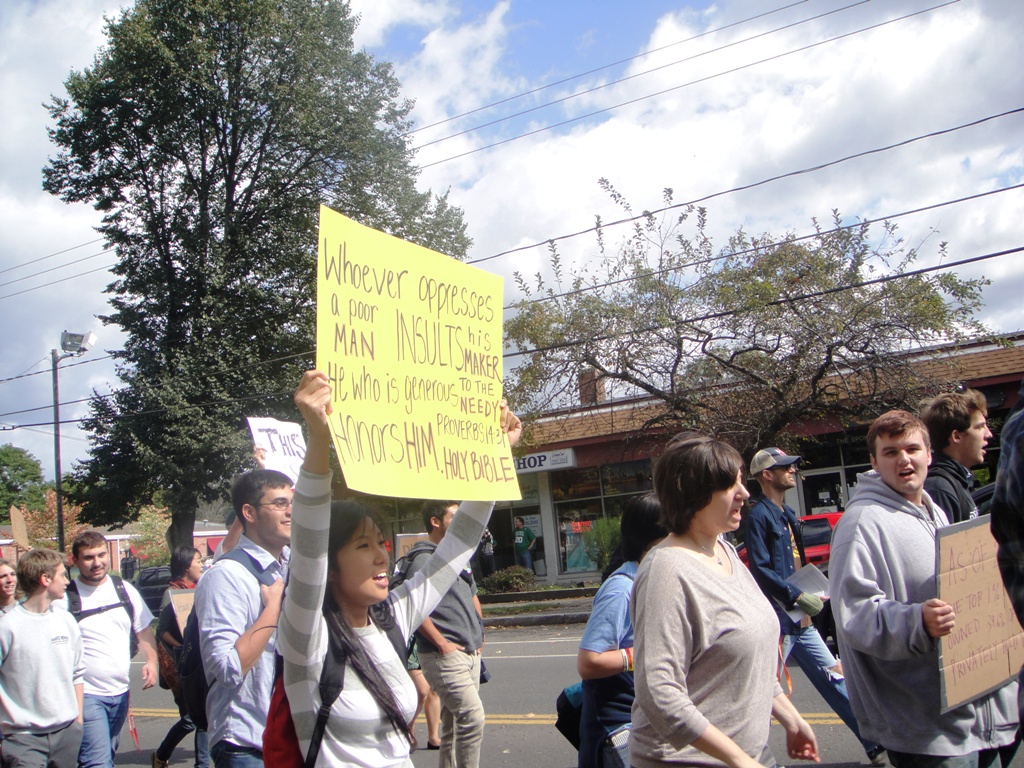

Occupy Wall Street, which has governed much national attention over the past two months, has spawned hundreds of smaller solidarity movements in colleges and universities nationwide. One such solidarity movement — fittingly called “Occupy Amherst College” — has emerged here.
The developing group, which has been active in some form since early October 2011, has hosted a screening of the movie “Inside Job” and has joined forces with other solidarity groups such as Occupy UMass and Occupy Amherst to hold several protests both on the Amherst and UMass campuses, as well as in the town of Amherst itself.
On Nov. 17, a date selected to commemorate the two-month anniversary of the national movement, Occupy Amherst College again joined Occupy UMass and Occupy Amherst in a rally at the Amherst branch of Bank of America. About 100 protesters occupied the lobby of the bank chanting “Bank of America / Bad for America.” The groups then marched to the College and back to UMass, where Occupy UMass has an encampment.
Despite participating movements all across the country, Anna Castro ’12 disagreed with the idea that Occupy Amherst College consists wholly of promoting the initiatives of Occupy Wall Street.
“The reason to start local movements is to focus on local issues,” said Castro. “Occupy speaks to being actively involved in a community. This involves getting engaged in [our] surroundings — more than just someone that votes.”
Castro insisted that one purpose of Occupy Amherst College is to foster dialogue that would account for addressing issues on campus, such as diversifying faculty.
“These movements help to fuel national dialogue and action concerning the presently precarious state of our nation,” Maya Sisneros ’13 said.
Brianna Hanny ’13 says that it is important that the College community understand the Occupy movement is relevant to them. “I do not believe that anyone can excuse themselves from what has happened and is happening in the United States right now,” Hanny said. “There are students on this campus and people in this community that want to see change happen, not only at this institution, but nationally. Being a student at an elite institution does not exempt [you] from political action and protest. The College community is not immune to the social conditions and injustices that also affect the country.”
Occupy Amherst College may still be in its early stages, but it is already beginning to leave a mark on the College community. Admitting that her experience with Occupy Amherst College has thus far been “limited,” Hanny nevertheless thinks that it has also been positive.
“Being involved has shown me that there is a solid group of people that acknowledge the inequalities and want to do something about them,” Hanny said. “It has been encouraging to see not only with Occupy, but throughout the semester, mass mobilization of people in demand for change and against injustice.”
Those interested in learning more about the Occupy movements attend an event scheduled for today called #occupyRedRoom. New York Times columnist Joe Nocera will be speaking in the Cole Assembly Room at 7:30 p.m. regarding the financial issues underlying the Occupy Wall Street movement and the path forward. The event is sponsored by the Association of Amherst Students, Social Council, Program Board and the Student Activities Office.